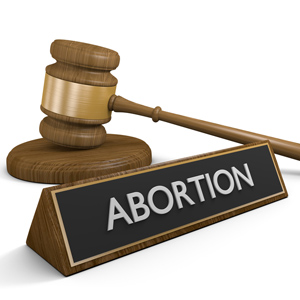Alabama governor signs abortion ban; which cases are headed to the Supreme Court?

Image from Shutterstock.com.
Updated: On Wednesday, the American Civil Liberties Union vowed to challenge Alabama’s abortion ban that was signed into law the same day by Alabama Gov. Kay Ivey.
The bill, which takes effect in six months, creates an exception for mothers whose lives are at risk, but includes no exception for rape or incest, the New York Times reports. It bans abortions at every stage of pregnancy and makes it a felony for doctors to perform the procedure, punishable by up to 99 years in prison.
Randall Marshall, executive director of the ACLU of Alabama, criticized the new law in a statement. The law “is simply a political effort to overturn 46 years of precedent that has followed the Supreme Court’s Roe v. Wade decision,” Marshall said. “We will not allow that to happen, and we will see them in court.”
The new law is the most restrictive in the nation, but Alabama isn’t the only state moving this year to restrict abortions, the New York Times reports in a separate story.
Ohio’s governor signed a law in April that bans most abortions after a fetal heartbeat can be heard, which is usually after six weeks of pregnancy. The ACLU filed a suit challenging that law Wednesday, BuzzFeed News reports.
Also on Wednesday, the Missouri Senate passed a bill to ban abortions at eight weeks of gestation unless the mother’s life was in danger, CBS News reports. The state House approved the measure on Friday and sent it to the governor, the Washington Post reported.
Georgia, Kentucky and Mississippi also passed fetal heartbeat laws this year. North Dakota and Iowa also have six-week abortion bans, according to BuzzFeed. The laws either have been blocked in court or they haven’t taken effect yet. Lawmakers in 11 other states also are considering such laws, according to the New York Times.
Some of the fetal heartbeat states are among six states that have only one abortion clinic left. They are Kentucky, Mississippi, Missouri, North Dakota, South Dakota and West Virginia.
Abortion opponents hope that the laws will lead the U.S. Supreme Court to overturn Roe v. Wade. But the current Supreme Court is more likely to take an incremental approach that approves abortion restrictions without overturning the right to abortion, report the New York Times, USA Today and the Washington Post.
In 2016, the Supreme Court overturned two provisions of a Texas law that required abortion facilities to comply with hospital standards and required abortion doctors to have admission privileges at a nearby hospital. The vote in Whole Woman’s Health v. Hellerstedt was 5-3, with Justice Anthony M. Kennedy in the majority.
Since then, Kennedy has been replaced by Brett M. Kavanaugh, and Neil M. Gorsuch has replaced the late Justice Antonin Scalia, who had died before the court decided Hellerstedt.
Now, a similar law in Louisiana has come before the court. The Supreme Court voted 5-4 to temporarily block the law in February, with Chief Justice John G. Roberts Jr. joining liberal justices in the majority. It “seems inevitable” that the case will return to the court, according to the Washington Post.
Also pending before the court is a cert petition in a challenge to an Indiana law signed by Vice President Mike Pence when he was governor of the state. One provision of the law would bar abortions sought because of gender, race or potential disability of the fetus. A second provision requires an aborted fetus to be buried or cremated. Another Indiana law that is the subject of a separate cert petition requires women to get ultrasounds at least 18 hours before an abortion.
Other laws headed to the court ban dilation and evacuation abortions and ban abortions after a certain number of weeks, according to USA Today.
Updated May 16 at 4:39 p.m. and May 17 at 12:35 p.m. to include information about the Missouri bill.



